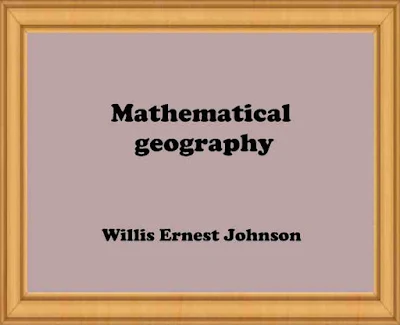Mathematical geography
In the greatly awakened interest in the common-school subjects during recent years, geography has received a large share. The establishment of chairs of geography in some of our greatest universities, the giving of college courses in physiography, meteorology, and commerce, and the general extension of geography courses in normal schools, academies, and high schools, may be cited as evidence of this growing appreciation of the importance of the subject.
While physiographic processes and resulting landforms occupy a large place in geographical control, the earth in its simple mathematical aspects should be better understood than it generally is, and mathematical geography deserves a larger place in the literature on the subject than the few pages generally given to it in our physical geographies and elementary astronomies.
It is generally conceded that the mathematical portion of geography is the most difficult, the most poorly taught and least understood, and that students require the most help in understanding it.
The subject matter of mathematical geography is scattered about in many works, and no one book treats the subject with any degree of thoroughness, or even makes a pretence at doing so. It is with the view of meeting the need for such a volume that this work has been undertaken.
Although designed for use in secondary schools and for teachers' preparation, much material herein organized may be used in the upper grades of the elementary school.
The subject has not been presented from the point of view of a little child, but an attempt has been made to keep its scope within the attainments of a student in a normal school, academy, or high school. If a very short course in mathematical geography is given, or if students are relatively advanced, much of the subject matter may be omitted or given as special reports. To the student or teacher who finds some portions too difficult, it is suggested that the discussions which seem obscure at first reading are often made clear by the additional explanations given further on in the book.
Usually, the second study of a topic which seems too difficult should be deferred until the entire chapter has been read over carefully. The experimental work which is suggested is given for the purpose of making the principles studied concrete and vivid. The measure of the educational value of a laboratory exercise in a school of second grade is not found in the academic results obtained but in the attainment of a conception of a process.
The student's determination of latitude, for example, may not be of much value if its worth is estimated in terms of facts obtained,. but the forming of the conception of the process is a result of inestimable educational value. Much time may be wasted, however, if the student is required to rediscover the facts and laws of nature which are often so simple that to see is to accept and understand. Acknowledgments are due to many eminent scholars for suggestions, verification of data, and other valuable assistance in the preparation of this book.
Download Mathematical geography - PDF 8 MB


